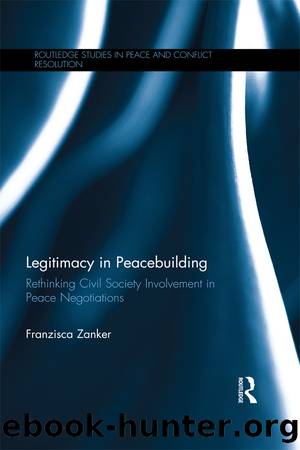Legitimacy in Peacebuilding: Rethinking Civil Society Involvement in Peace Negotiations by Franzisca Zanker

Author:Franzisca Zanker [Zanker, Franzisca]
Language: eng
Format: epub
ISBN: 9781138685376
Google: r19evgAACAAJ
Goodreads: 32574081
Publisher: Routledge
Published: 2017-09-15T00:00:00+00:00
* * *
Market Women Gbarnga Market Women Association; UN; Ellen Johnson Sirleaf
Teachers Gbarnga CSAs; international community
Youth Gbarnga ECOWAS; UN
Market Women Ganta ECOWAS; UN
Teachers Ganta UN; warring factions; Council of Churches
Youth Ganta Muslim and Christian community; civil society actors; political parties; UN; health sector
Interpretations of representation in Liberia
According to a news report at the time âcivil society representatives, who said they represent the views and aspirations of the about 3.5 million Liberiaâs [sic], were said to be conferring among themselvesâ (IRIN News 2003, emphasis added; see also L1_14). But how do we know these actors represented the Liberian population? One way of showing this was by the symbolic status held by some actors as guarantors of legitimacy (through motherhood narratives or grassroots representation as shown previously). Another way is to interpret the very nature of representation. Two major interpretations of âlegitimateâ representation are first the understanding of suffering and shared experiences and second neutrality. The importance given to these subjective emotions means that feeling represented more generally is an additional factor in constructing legitimacy. This is discussed next in the following paragraphs, also making the inverse argument: a sense of exclusion acted in detriment to creating legitimate peace negotiations.
A starting point for considering representativeness is to look at the definitions of representation from the point of view of civil society. One of the civil society activists who took part in the negotiations said âwe had the people in the back of our minds ⦠we knew what was neededâ (L13). Returning to the example of the IRCL, who represented both the Muslim and Christian communities, the group argued that their representativeness was adequate because of the travels they undertook all over the country. Passing on information and grievances through networks of religious leaders to the higher echelons based in Monrovia gave them a unique position in being able to represent the population (e.g. L41). Expanding on this idea, Sheik Konneh explains:
Are we ignorant of what was going on so we could not represent the civilians? No we were affected by the war the same way as ⦠the civilians. We knew the problems of our people ⦠we never had the time to go to mosque and church anymore. Women had no time to go to the market to get food; the business leaders could not open their business. So we were all affected, maybe not in the same way, but still affected.
(L41)
Download
This site does not store any files on its server. We only index and link to content provided by other sites. Please contact the content providers to delete copyright contents if any and email us, we'll remove relevant links or contents immediately.
Goodbye Paradise(3810)
Men at Arms by Terry Pratchett(2837)
Tobruk by Peter Fitzsimons(2518)
Borders by unknow(2315)
Arabs by Eugene Rogan(2299)
Pirate Alley by Terry McKnight(2221)
More Than Words (Sweet Lady Kisses) by Helen West(1867)
Belonging by Unknown(1857)
It's Our Turn to Eat by Michela Wrong(1731)
The Biafra Story by Frederick Forsyth(1656)
The Source by James A. Michener(1613)
Botswana--Culture Smart! by Michael Main(1602)
Coffee: From Bean to Barista by Robert W. Thurston(1545)
A Winter in Arabia by Freya Stark(1538)
Gandhi by Ramachandra Guha(1532)
The Falls by Unknown(1526)
Livingstone by Tim Jeal(1489)
The Shield and The Sword by Ernle Bradford(1409)
Africa: Altered States, Ordinary Miracles by Richard Dowden(1384)
